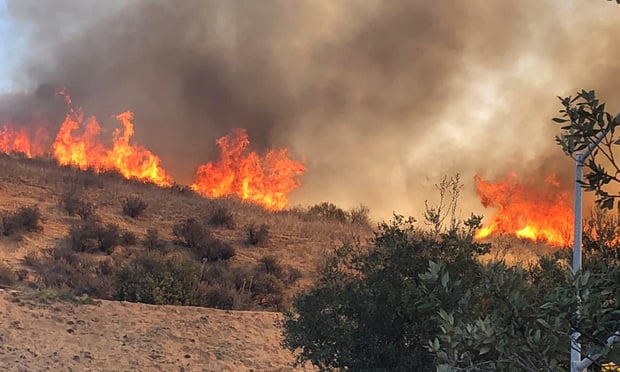Satisfaction is difficult to guarantee, particularly when property/casualty insurers deal with claimants, but both Jonathon Young and Peter McMurtrie focus on doing just that for Harleysville Insurance and Grange Insurance, respectively.
The two chief claims officers agreed to answer a series of questions on a variety of topics ranging from the state of their claims administration systems to how their claims personnel best deal with claimants and independent agents.
Young is senior vice president and chief claims officer for Harleysville and is new to the insurance industry. He joined Harleysville in 2009 after a career spent as an attorney.
(For more on Harleysville, click on this archived story.)
McMurtrie, chief claims officer for Grange, joined the company in 2006. He oversees the company's entire claims operation, including personal and commercial lines. He also is part of Grange's national catastrophe team and is among the first responders to areas throughout Grange's footprint hit hardest by severe weather. (McMurtrie turned one question over to Carol Drake, vice president of marketing for Grange.)
For more on Grange, click on this archived article.)
What kind of feedback do you receive concerning customer satisfaction? Do you have a customer satisfaction goal you aim for?
JY: We routinely follow up on closed claims related to promptness of communication, promptness of settlement, overall claims service, explanation of the claims process, and courtesy and professionalism. Our goal is a satisfaction score of 95 percent or better. If we get low numbers based on a particular claim, we investigate it further to see what problems occurred. We are systematically trying to engage our insureds in a way to determine how satisfied they are with our services.
PM: We utilize a phone vendor that surveys more than 1,000 customers a month for our personal lines claims. We ask a series of questions with the money question being: Based solely on your claims experience, what is your willingness to recommend Grange to your friends and family? Ninety-six percent of those surveyed would recommend Grange as a result of their claims experience. The other customer set we are attentive to is our agents. We do an annual agent survey where we cover all the different categories of the business, one of which is their claims experience and whether they view Grange as the easiest to do business with out of all their carriers. We also ask agents for feedback on areas such as claims technology and catastrophe response.
Do you monitor social media in terms of customer satisfaction?
JY: We are beginning to look at things such as Twitter and Facebook. When we think of customers, we consider both our insureds and our agents, because we deal exclusively through independent agents. We have an online tool the agents can use to comment to us about anything. We don't have any [online] connection to the insured at this point. We currently have a legacy claims system, and we are changing to a new system from Guidewire, which will give us the ability to have more direct interaction with the actual insureds. We're looking forward to that.
CD: We monitor [social media], and we currently are working on a complete digital strategy to take full advantage of social media. We are going to push that initiative through this year. Part of that strategy will be to leverage social media to a much greater degree and to share with people the value of Grange. Our value proposition is one of the strengths of the company, and that revolves around claims. We haven't had a ton of activity with people posting [online] about us, but we actively are going to engage that space going forward.
Where does the claims department fit in with your company's customer retention plans?
JY: The way we look at it is we have about 60,000 opportunities every year to make a favorable impression with our customers–the customer being the insureds and the agents. What we try to do is handle every claim as fairly, as consistently, and as efficiently as possible. We try to keep the agent completely up-to-date on what we are doing. We have in each of our regions a claims territory manager who establishes relationships with all the agents. If the agents have any complaints or just want regular communication from the claims department, we have one person in each of our regions who is in contact repeatedly with those larger agents. We also have someone who reports directly to me who is responsible for all agency relationships. If there is a big claim that is going to have a negative impact in terms of reserves or settlement, we will call the agent beforehand and let the agent know what is going on. In addition, we are piloting a technology program where every time we change a reserve or settle a case we give real-time notice to the agents.
PM: We are well aware for those insured who have had a claim, one of the reasons they decide to stay with a company or not is based on that claims experience. We recognize we have to deliver a claims experience that is positive. We're fortunate only about 10 percent of our customers have had a claims experience, but we are trying to retain our entire book of business, so 90 percent of our customers have not had a claims experience. How do we bring value to those folks? It means working with our marketing area to reach out and educate our customers with loss prevention and loss avoidance information and weather safety tips. When we talk about our digital strategy, a big part of that involves leveraging that interaction and bringing our claims expertise to the customer not when they have had a loss but to help them avoid having a loss.
How do your claims people interact with claimants–phone, chat, e-mail? How do you monitor their performance in these areas?
JY: Primarily we are still doing most of it by phone. When we have the new [Guidewire] technology in place we are hoping to be more varied in the way in which we communicate. At this point, first notice of loss (FNOL) generally is done by phone. We listen to phone conversations and audit the FNOL intake, but most of our communications with our claimants is by phone.
PM: Kicking off the claims experience comes to us through our loss reporting areas. To monitor that interaction, we do call recording. When we measure the quality of the interaction, it's not just what the individual is documenting; we work to monitor and understand both sides of the interaction. Are we leveraging the appropriate amount of empathy in that conversation? Are we listening to clients and picking up on subtle messages they may be delivering to us? We talk [to our claims staff] about delivering the ultimate customer experience. It's more than just delivering on the check, it's the overall experience: taking the mystery out of it; alleviating the unknown or uncertainty; and assisting them through the entire claims process to a desirable outcome that fits their individual needs. We use a combination of either phone or e-mail, depending on customer preference, as well as face-to-face interaction on damage assessment. The ultimate customer experience is more than writing out the estimate and paying the right amount, but did we meet the customers' needs and help them get back to whole in a way that was pleasant? When you listen to customers and find out what impacts their satisfaction, it's things such as did you help them understand the process, did you meet their individual needs, did you listen to them, and did they feel like they were treated fairly? That 96 percent goal we are currently achieving, we strive to make that better. We believe there is a way to do that that doesn't compromise on the indemnity management component, which we have to be able to control. When we think about customer service, it is to 100 percent of our customers, and if we are overpaying claims, that means we are raising rates to all our customers, and that's not good customer service.
How satisfied are you with your claims administration system? What areas work best?
JY: Our new system will provide us the ability to do FNOL online and a lot of different things. We are just beginning the implementation. To make sure we get things right, we are going through a blueprint process with consultants where we make preliminary decisions on what we want to accomplish with the Guidewire system. We hope to have the system up and running within two years. The old system was a legacy system that grew up in a lot of different ways and was complicated. Some of our adjusters were looking at six or seven screens at the same time. [The current system] works because we have good people who work really hard, but we do think we can achieve significant efficiencies with the Guidewire system. We will be able to handle more claims and handle them better. It will move us ahead of the game.
PM: We have a claims administration system that is current within the last 10 years, so it's not a legacy system, and it is relatively user friendly. We work in a paperless environment, so all our staff's work is done within the system. The speed of technology development is so rapid. We really think the recorded interaction with our customers as well as claims systems being able to integrate with those recordings and also integrate with CRM systems are something that is going to develop over the next few years. We are satisfied with what we have today, but we are watching to see what is going to develop over the next few years. How do we tie that in with a digital strategy so we are able to interact with our customers in the way they want while also making it as easy as possible for our associates?
What inroads are you making in the area of self-service for claimants?
JY: We are going to have a Web site for the reporting of claims, and Guidewire will let us be more interactive. We are looking to get ahead of that curve in terms of dealing directly with the client online. Right now, our technology limits our ability to do that. The legacy system doesn't allow us to accumulate data or do anything with respect to online inquiries. Guidewire will allow us to do that.
PM: We are doing self-service in a way that still allows the company to control indemnity management where we need to and allows Grange customers the flexibility to define how they want to interact with us. If they want to report their loss online or interact with us through e-mail, we do those things. If they want to interact with us through their independent agent, we allow the claims process to flow that way. The feedback we get is they want to be assisted through the claims process. They want that trusted advisor input they get from their agent.
How often do you reexamine your processes to determine their quality? Any examples of changes you have made recently?
JY: We've made some fairly significant changes. We used to have a regional structure where we had regional vice presidents reporting to the home office. We just eliminated that, and we are going to a line-of-business structure where the various line-of-business heads control things in the field and in the home office. We have three lines-of-business heads–one in casualty, one in workers' comp, and one in property. We are driving things more directly from the Harleysville location. The Guidewire system has all kinds of features that permit us to track data more efficiently. With our line-of-business structure and our ability to track data more efficiently, we are really going to push things forward.
PM: We stay current with the latest technology developments in claims systems through Celent and then interact with various vendors to understand where they are going in the future. We also like to provide a voice in terms of where we think [vendors] should be going. Changing out a claims system is a very significant investment in terms of the dollars as well as the disruption level within your staff. There has to be a compelling reason to change, and that comes back to what is the lift that technology is going to give you in the marketplace to justify that expenditure.
Is the role of the adjuster changing with your company? Are there issues the industry needs to face concerning the quality and experience of adjusters?
JY: We are an in-house shop with adjusters. Over the last year, we haven't changed the role of the adjusters much. The Guidewire system will allow us to do more specific and organized things with our adjusters and be more objective in the way we handle claims. Right now adjusters are being used pretty much as they've been used in the past. We're hoping to improve that as the Guidewire system comes into effect. We really have good people, and we are working hard to attract talented people to entry-level positions so that we have a strong bench if higher-level individuals leave the company. My experience in the insurance industry demonstrates to me it is fascinating and there are a lot of interesting things going on, so we need to use that as a way to find really good people for entry-level positions.
PM: We have very little reliance on independent adjusters. When it is a Grange adjuster involved in the loss, we have higher satisfaction levels and better indemnity management, and it costs us less. While I hear every year about the aging of the adjuster staff, we have not seen that as an issue. We've had high retention levels, and we've been able to attract younger individuals into the industry. When you look at what we offer–the insurance industry pays competitive salaries; outside adjusters are being given a car, wireless-enabled laptops, GPS; they work in a paperless environment–it is very much a high-tech field that allows them to interact with customers. The neat thing about adjusters is we get to help people when bad things happen. We find the banking industry has been a tremendous area for us to recruit from. [Bankers] understand risk management, accuracy, and how to do things from an accounting perspective. We continue to focus on the technical skills [adjusters] need for the job, but we've broadened that to the behavioral competencies. Not only how you do your job but how you do it more effectively. Those behavioral competencies not only affect and improve our indemnity management, but they elevate the customer experience.
What effects has the financial crunch of the past two years had on the way your claims department operates?
JY: The financial crisis hasn't affected how we handle claims. Our claims service is the same great service we've always provided. We have a lot of people working hard and doing even better work. And Guidewire should make the processes even simpler.
PM: We've always had an expense discipline. You want to be able to invest in the future, but to do that, you have to be able to find where you can create savings elsewhere. Because we have had that [expense] discipline, we haven't had to change anything because of the financial crunch. We recognize you can be too cheap and under-invest in that area, and the adverse impact of doing that is pretty extreme.
Want to continue reading?
Become a Free PropertyCasualty360 Digital Reader
Your access to unlimited PropertyCasualty360 content isn’t changing.
Once you are an ALM digital member, you’ll receive:
- Breaking insurance news and analysis, on-site and via our newsletters and custom alerts
- Weekly Insurance Speak podcast featuring exclusive interviews with industry leaders
- Educational webcasts, white papers, and ebooks from industry thought leaders
- Critical converage of the employee benefits and financial advisory markets on our other ALM sites, BenefitsPRO and ThinkAdvisor
Already have an account? Sign In Now
© 2025 ALM Global, LLC, All Rights Reserved. Request academic re-use from www.copyright.com. All other uses, submit a request to [email protected]. For more information visit Asset & Logo Licensing.








